Paul NajiBBC Africa, Saint Lewis
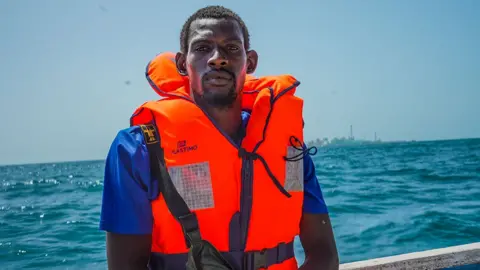 Michelle Mavando / BBC
Michelle Mavando / BBCEvery day, Goura Fall, a hunter in the northern city of Saint Louis, is heading to the sea with a mixture of feelings: hope and frustration.
He hopes to get a better fishing than the previous day, however he is frustrated by the belief that everything he finds may not meet his needs.
“Before, we have worked to live, but now we are only working to stay,” says 25 -year -old.
Likewise, many young traditional fishermen face in Saint -Rouis – a main hunting center – difficult times.
BBC spoke to many fishermen and people associated with fishing trade who all refer to one reason – LNG platform located on the marine border between Senegal and Mauritania, off the coast of Saint Louis.
The largest GTA gas project is operated by the British multinational oil and gas giant as part of a joint venture with Kosmos energy, as well as Petrosen and SMH, national oil companies for Senegal and Mauritania, respectively.
BP, which has a 56 % interest in the project, started its operation in Senegal in 2017 after the discovery of natural gas two years ago.
Described as one of the deepest sophisticated gas development plans in Africa, it is expected that the first phase of the naval project, which extends billions of dollars about 2.3 million tons of LNG annually for more than 20 years.
However, the residents of St. Louis say this also comes with restrictions on fishing that depends on 90 % of the city’s population over the age of 250,000 on livelihoods.
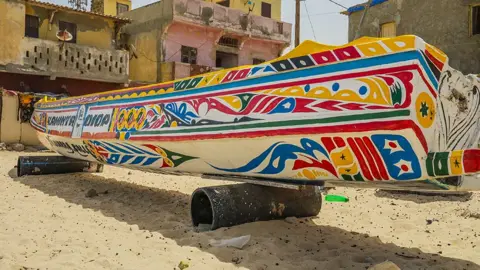 Michelle Mavando / BBC
Michelle Mavando / BBCOn Tuesday morning, with the announcement of favorable weather conditions, Mr. Fall is preparing his wooden boat coated with patterns of red, blue, yellow colors, and others.
With his hints and taste, he set out for the hunting trip per day.
After driving 10 kilometers (6.2 miles) abroad, the young hunter is approaching the giant gas facility. But he says he cannot approach due to an exclusion area of 500 meters that restrict fishing.
“The authorities prevent us from hunting in that area from the platform, under the penalty of confiscation or even destroying our fishing equipment if we reach it,” Mr. Fall told BBC.
The fishermen say that the platform is based on the natural coral of fish rich in fish – the restrictions mean that their trap is smaller and barely earns a living. This has doubled the difficulties they already faced with competition for fish from large international ships.
“We are very frustrated,” says Mr. Fall.
“Now we can stay until four in the afternoon that connects our thumb, without a fish.”
“Safety areas on infrastructure are a record exercise to protect people and assets,” BP says about the concerns about Senegalese hunting stocks before the date of the gas project.
During a forum held in Saint Louis in October 2024, the Minister of Energy in Senegal Piram Soleoub Diop expressed the need to use oil and gas to coexist with hunting, which he described as necessary for the local community.
Fishing is approximately 60,000 direct jobs and more than half millions of indirect jobs in Senegal, according to the United Nations Food and Agriculture Organization (FAO). According to what was mentioned, one in every six people is employed and represents about 3 % of the country’s gross domestic product.
Most of those working in this sector are small, traditional, or “literal”, hunters and treatments.
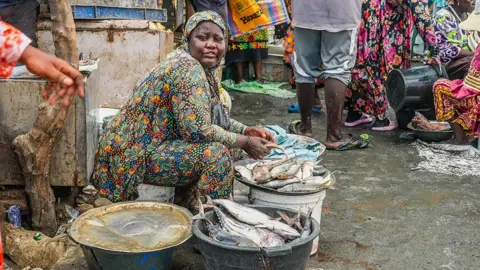 Michelle Mavando / BBC
Michelle Mavando / BBCTreatment is often traditionally by women. But with a decrease in the number of fish in Saint Louis, many lose their functions.
Diamol Sen, which dries salted fish in the sun, says that some women who have worked before them on the fish processing site are now unemployed.
“Fish are very expensive, and the transport costs are high. Today we win enough to cover expenditures,” says 10 -year -old.
If the boats can go out to the sea and return with it [abundant] “Hunting, all women will return to the site to work,” she says.
The fishermen say they are accustomed to achieving between $ 445 and 625 dollars (330 pounds and 465 pounds) from one hunting trip, but at the present time, they are struggling to get 90 dollars.
Decreased profits drive many fishermen, including Mr. Fall, to think about abandoning their centuries -old practice, which are a more tradition than trade.
“We are forced to continue our fishing activity, because we do not have another option,” he says.
“But if a job opportunity arises, we will take advantage of it without hesitation.”
Others have already abandoned hunting for alternative opportunities, including migration to Europe.
One of them is the 38 -year -old fishing. Since 2021, the fishermen have long been working as a jaws – production, repair and drawing of boats.
He developed the skill when he was younger and now sees it as a lifeline in the face of adversity.
“Currently, I earn a better life with carpentry more than hunting,” he says.
Although he admits that working as an irregular carrier, he feels that hunting has become “very difficult” due to the gas project.
BP insists that it is “committed to working with responsibility” alongside its partners and local communities.
While celebrating the launch of gas exports from the facility in April 2025, the Minister of Energy called for “continuous vigilance to ensure the efficiency, transparency and sustainability of the economic benefits of the population.”
The government also praised the gas project as a project that enhances the country’s position on the global energy scene, and obtained biological foreign currencies.
Members of a local association representing craftsmen in St. Louis say that BP did not fulfill its promise to create artificial coral reefs where they can hunt more fish.
These coral reefs were supposed to be an alternative, given that reaching natural coral reefs – known locally as Diattara – restricted.
“When they came in 2019, they told people:” We will build eight coral reefs for you “to replace Diatra with us at least.”
However, he says he is six years old, “nothing has been done.”
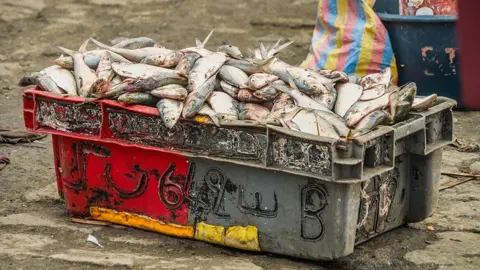 Michelle Mavando / BBC
Michelle Mavando / BBCThe British Broadcasting Corporation obtained documents from a study conducted by the CRODT peripheral research center in Dakar Biliwi, which indicates 12 potential sites that were initially explored to host artificial reefs. From these, six were identified as viable.
Only two of the sites were later identified and suggested to BP.
It describes the process of providing artificial coral reefs as “very slow.”
In a statement, BP said between 2021 and 2023, the feasibility and additional evaluation studies revealed that only two of the 12 sites were “evaluated” as feasible for coral reefs with a large size that is published without the risk of immersion or research.
“One of these sites was within the marine protected area (MPA) in St. Lewis, and therefore it was not offered, given that it will not provide immediate benefits of Sant Lewis Vidarfulk,” the statement added.
BP says that the chosen site will host a large complex for coral reefs will include 10 groups of coral reefs inside.
“The work is already underway, and coral reefs are expected to be completed by the end of 2025,” says BP.
The company says that the evaluation of the environmental and social impact approved in 2018 concluded that the loss of the potential causes of hunting in Mauritania and Senegal as a result of the gas project will be “small”.
Amid back and forth about the feasibility of artificial coral reefs, another point of dispute is the site.
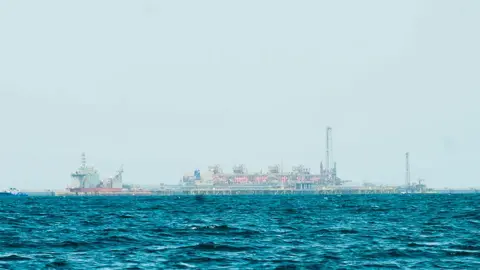 Michelle Mavando / BBC
Michelle Mavando / BBCThe fishermen say that BP plans to build artificial coral reefs just 4 kilometers from the coastal line, describing the situation as favorable to attract fish.
However, BP says that the technical evaluation concluded that a “group” of “coral reefs” in this site allows more effective management and protection for this coral reef.
The Senegalese government said that there was a gas leak in February 2025-and BP was described as “gas bubbles”-in one of the wells managed by the oil and gas giant.
The accident sparked concerns about the safety of marine life about the facility.
Mamadu Pa, a Dakar -based Ucean activist with Greenpis Africa, says that gas leakage can have “countless effects” on the environment.
“BP refuses to detect the actual amount of gas leakage,” says Mr. PP.
Experts have found that this gas leakage has the ability to destroy marine animals, plants, coral reefs, algae and resources that allow fish to feed.
However, the repetition of the word used to assess the loss of hunting lands, informed BPC that the environmental impact was evaluated as “small”.
“We have acted quickly, we were crowned the well, and we participated transparently with the organizers,” says multinationals.
In a joint statement on March 14, the ministries of the environment and energy in Senegal said that the tests and observations that were conducted there are no other leaks after the BP repair of the well.
“The satellite images, which were taken after the intervention, did not reveal the presence of bubbles or condensate on the surface of the water,” the statement says, with the expression of the commitment of both Senegalese and Mortar authorities to ensure a continuous improvement in managing the gas project activities “in order to reduce the occurrence of such differences in the future.”
But the leak added to the local concerns about the impact of the gas site.
Saint Lewis hunter representatives in St. Louis say the promise of economic prosperity through the project comes at a large cost.
They say it deprives them of free access to their extreme sea, leaving them an uncertain future.
It also accuses a bias government with BP at its expense.
“We have nothing but the sea to live in,” says Vall.
The Senegalese government did not respond to the BBC’s request for comment.
Additional reports by Michelle Mavando
You may also be interested in:
 Getty Images/BBC
Getty Images/BBC
https://ichef.bbci.co.uk/news/1024/branded_news/a367/live/864b04d0-9aef-11f0-928c-71dbb8619e94.jpg
2025-10-02 03:26:00














